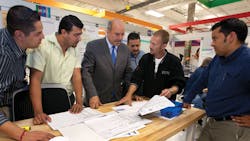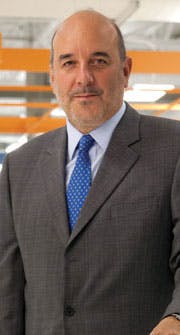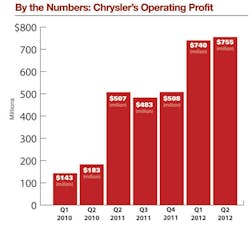World Class Manufacturing is Chrysler's Universal Language
Mauro Pino is a towering Sicilian with a baritone voice that’s fit for an opera singer. And that rich voice fills with excitement when he talks about the role of World Class Manufacturing, or WCM, in Chrysler’s latest renaissance.
“WCM is not another project or initiative,” says Pino, who was named Chrysler’s head of North American World Class Manufacturing on Feb. 1. “There will not be another initiative next year. There will not be another initiative in 2014. It’s not the flavor of the week. This is the way we run our business.”
And with good reason. WCM -- an operating methodology that focuses on trimming waste, boosting productivity and improving quality and safety -- helped resurrect Fiat SpA (IW 1000/48), “a company that was really close to the cemetery,” notes Pino.
Pino, who joined Fiat in 1987, sees WCM perhaps playing an even larger role in Chrysler’s resurgence.
While Fiat’s comeback largely hinged on improvements in product design, logistics and purchasing, he asserts, Chrysler’s spectacular turnaround has been driven by a transformation of its manufacturing operations.
“In Chrysler, it’s a different story,” he emphasizes.
The importance of WCM was underscored this year during Chrysler’s first-quarter earnings call, when CEO Sergio Marchionne told investors and analysts that WCM is “having significant benefits in terms of earnings.”
Pino believes it was the first time that Marchionne has made such an explicit connection -- at least on an earnings call -- between WCM and the automaker’s financial results.
“I tell you if the big boss decides to speak about this, it means that the contribution is not secondary,” Pino says in his heavy Italian accent. “It was a big surprise.”
'Street Cred'
The fact that Marchionne tapped Pino to spearhead Chrysler’s implementation of WCM in North America shouldn’t come as much of a surprise, however.
After leaving Fiat in 2001 for a job at Cleveland-based Eaton Corp. (IW 500/72), Fiat lured him back in 2007 to turn around the automaker’s Termini Imerese plant in Sicily. Under Pino’s leadership, the plant boosted its quantifiable progress in achieving WCM goals from 19 to 58 out of 100 points on the WCM scoring system -- good enough for a “bronze” certification. (For more on the WCM scoring system, see sidebar below, "World Class Manufacturing at a Glance.")
In April 2010, Pino took over two struggling factories that comprise Chrysler’s Toledo (Ohio) Assembly Complex, where his marching orders from Marchionne were “to make a big transformation in the plants using the WCM methodology,” Pino explains.
“And this, I have to tell you, worked very well,” Pino says.
Pino already had established a reputation for being a “missionary” for WCM, having previously audited Chrysler plants on their progress in achieving WCM goals. Not surprisingly, he spread the WCM principles throughout the Toledo complex with near-religious zeal.
He spent much of his time on the plant floor looking for waste, which -- as defined by WCM -- could include accidents, equipment breakdowns, excess inventory and even extraneous footsteps.
Pino recalls his horror when he saw one body-shop worker having to walk 70 steps each time she performed her various tasks on a vehicle body.
“That means we paid that lady to prepare for a marathon, not build a car,” Pino says.
Suffice to say, the plant reconfigured her work area to cut her average steps down to 15 or so, as part of a WCM principle known as “the Golden Zone,” which calls for parts to be delivered to employees to reduce nonvalue-added walking.
“We want to pay the employee for working, not walking,” Pino declared during his keynote address at the “Fast Forward” manufacturing conference presented by IndustryWeek and the Italian Trade Commission in June. “The customer expects to pay for the bolt that a worker screws on, but not for the time spent retrieving the part.”
But WCM, he told manufacturers at the conference, is not just about the technical side of plant operations. What makes WCM different from other continuous-improvement methodologies is that “the human element is at the center of WCM.”
“Team members understand that they have a vital role to play in improving their areas of work,” he said during his keynote.
It’s a precept that Pino clearly has taken to heart. Within six months of his arrival in Toledo, workers at the complex contributed more than 11,000 ideas to boost productivity and cut costs, and he notes that nearly 80% of those suggestions were put into place.
The results speak for themselves. This past November -- about a year and a half after Pino took the helm in Toledo -- Marchionne visited the complex to announce that it had secured production of the next-generation Jeep SUV, along with 1,100 new jobs.
Then in July, the Toledo site became only the third Chrysler plant in North America to earn bronze certification (it was one of the lowest-scoring sites in the company when Pino arrived there), scoring 52 points on a WCM audit.
Those achievements, Pino says, only have added to his “street cred” as a true disciple of WCM -- which he believes will help him achieve his objectives of implementing WCM at all 30 of Chrysler’s plants in the United States, Canada and Mexico.
“I think they put me in this position because of the energy that I have, for sure, and the fact that the street credibility enables me to work together with plant managers to help them speed up the application of the [WCM] methodology,” Pino says.
‘A New Language’
While only three Chrysler plants in North America have achieved bronze status -- the first level of WCM certification -- Pino notes that the pace of implementing WCM in Chrysler’s plants has been faster than in Fiat’s factories.
“One reason is that when we started [introducing WCM] at Fiat in 2006, it was a new system, and some mistakes were made,” Pino says. “At Chrysler, we didn’t repeat those mistakes, obviously.”
Also working in his favor is his belief that the U.S. workforce -- based on his experience at Eaton and Chrysler -- is “the best we have on the planet.”
“But we need to give them a clear direction,” he says. “We cannot permit to give them a confused direction, or a direction that can be misunderstood.”
That’s where leaders such as Pino come in. It’s also where Chrysler’s World Class Manufacturing Academy in Warren, Mich., plays a strategic role.
Chrysler opened the academy in January at the UAW-Chrysler Technology Training Center “to help accelerate the pace and rigor of WCM implementation,” as the company puts it. The academy offers more than 40 classes on concepts from the 10 managerial and technical rubrics, or “pillars,” of WCM, emphasizing hands-on problem-solving exercises.
Early on, Chrysler execs worried that they would have to strong-arm plant managers to ship workers to the academy, notes Pino. But that hasn’t been the case.
Through June, 1,500 workers from 40 facilities had attended training sessions at the academy, and Pino notes that the academy has more than twice as many applicants as it has open slots for training. In just six months, Chrysler has documented $1 million in savings from plant-level WCM projects that were inspired by training sessions at the academy. By year’s end, the automaker expects that figure to grow to nearly $2.5 million.
The academy is the first of its kind for Chrysler and parent company Fiat. But given its initial success, it’s not hard to imagine more academies sprouting up in other countries where Fiat operates, as the automaker pushes for all of its plants to be fluent in the WCM methodology.
“WCM is a new language for our workers, and if you want to speak a new language, you need to study,” Pino says. “You can study alone, or you can buy the Rosetta Stone system. You can have a good friend teach you. But those [learning] systems cannot work in a company.”
Learning operational best practices from other plants, though, is an important component of the WCM system.
The automaker uses Microsoft SharePoint collaboration software to enable all 168 Fiat and Chrysler plants in 16 countries to cross-pollinate ideas. WCM’s scoring system, in which auditors from different regions of the world evaluate plants on their knowledge and implementation of WCM strategies, encourages benchmarking within the company, Pino adds.
That only underscores the need for all plants within Chrysler and Fiat to embrace the WCM methodology, he says.
“If we don’t have a common language, we cannot speak between us,” Pino says. “We cannot leverage the best practices that we have around the world.”
|
World Class Manufacturing, or WCM, is the common operating methodology being implemented at Fiat SpA (IW 1000/48) and Chrysler plants throughout the world. WCM is a “structured, rigorous and integrated system that encompasses all plant processes, from safety to the environment, and from maintenance to logistics and quality,” Mauro Pino, Chrysler’s head of North American WCM, explained during the “Fast Forward” manufacturing conference presented by IndustryWeek and the Italian Trade Commission in June. “The goal is to continuously improve performance in order to reach the objective of zero waste,” Pino said. “Waste is broadly defined, and it includes the goal of zero accidents, zero breakdowns and zero inventories.” Among the key elements of WCM:
• The system is based on 10 technical pillars (such as safety, workplace organization and quality control) as well as 10 managerial pillars (such as commitment and clarity of objectives). |
About the Author
Josh Cable
Former Senior Editor
Former Senior Editor Josh Cable covered innovation issues -- including trends and best practices in R&D, process improvement and product development. He also reported on the best practices of the most successful companies and executives in the world of transportation manufacturing, which encompasses the aerospace, automotive, rail and shipbuilding sectors.
Josh also led the IndustryWeek Manufacturing Hall of Fame, IW’s annual tribute to the most influential executives and thought leaders in U.S. manufacturing history.
Before joining IndustryWeek, Josh was the editor-in-chief of Penton Media’s Government Product News and Government Procurement. He also was an award-winning beat reporter for several small newspapers in Northeast Ohio.
Josh received his BFA in creative writing from Bowling Green University, and continued his professional development through course-work at Ohio University and Cuyahoga Community College.
A lifelong resident of the Buckeye State, Josh currently lives in the Tremont neighborhood of Cleveland. When the weather cooperates, you’ll find him riding his bike to work, exercising his green thumb in the backyard or playing ultimate Frisbee.


